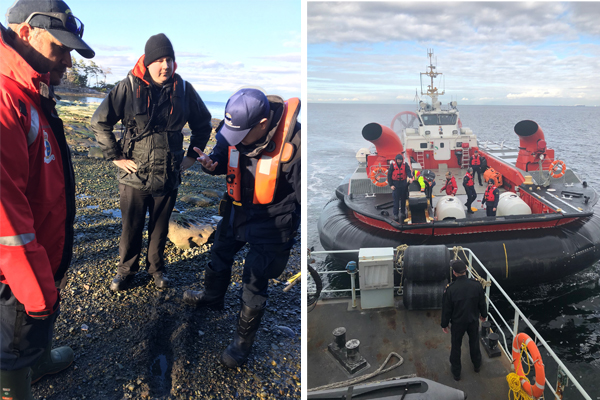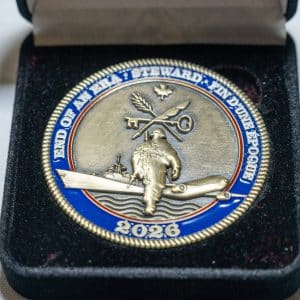
A representative from the Coast Guard surveys the shoreline with a crew member from PCT Wolf. In the end, no evidence of disturbance to the natural environment was observed. PCT Wolf and crew surveyed the Porlier Pass area following HMCS Calgary’s fuel spill.
Peter Mallett, Staff Writer ~
The Royal Canadian Navy and multiple government agencies came together quickly on Saturday Feb. 24 with a coordinated joint response following a fuel spill from HMCS Calgary.
The spill occurred in the Strait of Georgia between Nanaimo and Parksville as the frigate was conducting an internal fuel transfer; the incident involved the release of up to 20,000 litres of F-76 marine distillate fuel.
Calgary’s fuel spill response team reacted immediately. The ship reversed course to look for signs of the spill, and informed authorities at Maritime Forces Pacific (MARPAC) who engaged Emergency Management B.C., as per their Safety and Environment Management System guidelines.
MARPAC’s Formation Safety and Environment rapidly coordinated response efforts with Environmental Climate Change Canada, Canadian Coast Guard, Emergency Management B.C. and Transport Canada.
As a proactive measure Canadian Armed Forces assets at CFMETR Nanoose and the MARPAC Ready Duty Ship were put on alert to assist if needed.
Aircraft were launched overhead to look for visual signs of fuel floating on the surface of the ocean and report them to the Regional Joint Operations Centre. Transport Canada deployed their pollution detection aircraft, while private sector companies Harbour Air and B.C. Ferries were alerted to look for signs of the spill.
Commodore Jeff Zwick, Commander of Canadian Fleet Pacific, addressed the media at a press conference the next day to bring them up to date on the incident and the response effort.
“We take environmental stewardship very seriously and we’re working proactively to address the problem,” said Cmdre Zwick. “Once Calgary discovered she had difficulty, she took the right steps in responding to the problem.”
Four Orca-class patrol training vessels departed CFB Esquimalt Feb. 26 with Canadian Coast Guard and B.C. Government environmental officers on board. The vessels are equipped with response kits that include spill pads, portable absorbent socks, and hazmat bags with the intention to contain the spill and do initial cleanup if evidence of the spill was detected.
Cmdre Zwick explained that F-76 fuel, also known as distillate fuel, is lighter than water and evaporates quickly. It poses a low absorption risk and would be unusual for the fuel to remain in the water or combine with sediment in the ocean. The fuel is used for naval applications such as the operation of high and medium speed internal combustion engines of compression-ignition type boilers.
While an internal investigation has been launched to determine what caused the spill, MARPAC remains committed to its efforts to mitigate the effects of the spill, and continues to work with its partner agencies on monitoring and assessing the affected area.
A joint letter received March 1 from Environmental Health staff, and Senior Medical Officer and Medical Health Officers from First Nations Health Authority, Island Health, and the Provincial Health Office, indicates “the marine diesel release related to this particular incident represents a very low risk to humans through herring as a food source and no health advisory is necessary at this time.”
But that “a re-evaluation process be put in place, with involvement of communities, should any new information indicate potential spill impacts.”
If members of the Formation or the public detect signs of the spill they are encouraged to contact Emergency Management B.C. 1-800-663-3456 who are the central coordinating agency for all environmental incidents on the B.C. Coast.









